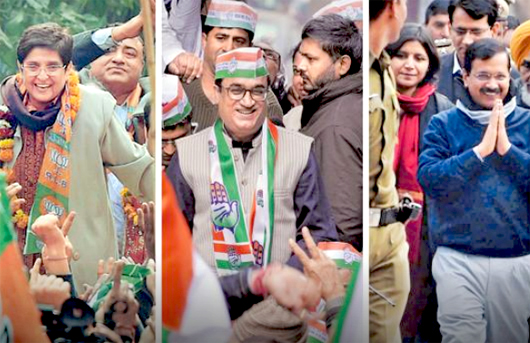New Delhi, Feb 7: A year after the Arvind Kejirwal-led government hastened the flashpoint on Jan Lokpal Bill and abandoned the people's verdict, Delhi votes again on Saturday in a keenly watched contest.

Voters will decide whether to give Delhi a decisive mandate in favour of the AAP or the BJP, or keep it a hung assembly even after a year of President's Rule.
Political parties are desperate for a clear verdict, pleading with voters with slogans like 'Poorn Bahumat (absolute majority)', 'Sthir Sarkar (stable governmnet)', 'Chalo chale Modi ke sath (Let's go with Modi)' and Paanch Sal Kejriwal (FIve years for Kejriwal)'. It has been a hard-fought campaign. A year under President's Rule, parties could never really take it easy. It was like a prep break between two exams.
Winning a state is always important for a national party. But Delhi's battle for the ballot is a different ballgame. Prime Minister Narendra Modi has already flagged it as an election the "world is watching". An Obama or a Merkel would not be interested in how the elections pans out in Patparganj or Matiala, but they just might be following the BJP juggernaut. For the party and its leader, it is a battle of honour.
For one, it will be a big popularity test for the PM, right at his seat of power. Many believe that the BJP, albeit late, anointed Kiran Bedi as the CM candidate not just to provide a counter-balance to Kejirwal but to insulate Modi from the embarrassment of an electoral defeat.
As successive opinion polls pointed in favour of the AAP, the BJP got all boots on the ground. Twenty two ministers, 120 MPs and chief ministers of BJP-ruled states were all in town for campaigning and taking charge of media briefings. BJP president Amit Shah and his colleague Union Minister Venkaiah Naidu have already urged the media not to judge the outcome of Delhi polls as a referendum on the Modi government.
Just nine months back, the Modi wave won the BJP all seven Lok Sabha seats and a 46% vote share in the Capital. At a rally in Dwarka, Modi exhorted voters to throw their lot with his "lucky" government. Delhi's multiple jurisdictions may make a tempting case for electing the party in Delhi that rules at the Centre. Would Delhi want to ride his luck?
Delhi electorate would also decide if it has forgiven Arvind Kejriwal who it embraced with much love just 14 months ago. His Aam Aadmi Party made a spectacular debut in the Delhi assembly, winning 28 of the 70 seats by selling a strong brand of political activism.
But once in government, AAP's unorthodox ways earned them uncharitable tags of being populists and anarchists. The party's tryst with power lasted only 49 days. Riding the high horse, Kejriwal thought he scored a moral victory. But the 'bhagoda' (deserter) tag stuck on, costing him the middle-class vote and a chance to score in the Lok Sabha polls last year.
All through the campaign this election, Kejriwal has been profusely apologising to the voters for abandoning the people's verdict. Projecting himself as politician who is not afraid to admit he made a mistake, he has played an emotional card while his party quickly went back to the drawing board.
A second chance is always hard to come by, but if the opinion polls are anything to go by, AAP's mopping up efforts has worked. The working class seems to be rooting for the party. The minority vote also seems to have slipped out of the Congress's hands.
For the grand old party, the fight is for survival, to remain politically relevant. More than its own leadership, it is the BJP which is hoping against hope that the Congress does well. A split in minority and working class vote may hurt the AAP.
The contest remains tight. In the absence of a talking-point agenda, eventually it may come down to credibility, and therefore, again to personalities. With political name-calling making daily headlines, who will Delhi trust to deliver is the big question the city voters will answer on Saturday. Let's hope it will be a clear mandate this time around.






Comments
Add new comment